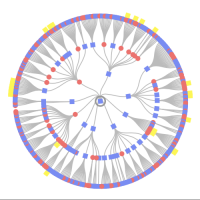Stop 'correcting' Julian Dates!
Project instructions for UK Lancashire non-conformist records tell you to 'correct' Julian dates to Gregorian dates. This is wrong, confusing and inconsistent. Prior to 1752, UK used the Julian calendar and the recorded dates were the legal dates. One should only index what was recorded. Once 'corrected', how is a user to know, if the image doesn't happen to be available, whether such a date has already been 'corrected'. And this advice is already inconsistent with what is currently indexed on FamilySearch - take for example the baptism record for Eliz. Scolefield, "England Births and Christenings, 1538-1975" • FamilySearch. This gives the baptism date as 26 January 1675, which is what the image shows. The project instructions would require this to be indexed now as 5 February 1676 (it is in a current batch for indexing a second time) - so would both results appear in future?
Comments
-
I agree - totally wrong, and against any practice I've previously encountered.
The problem is - how do you communicate with any "Indexing manager" or even the project leader? There are many other cases of individual project instructions being totally odds with the general ones and, in some cases, they lack any form of common sense.
The current problems with FamilySearch indexing need to be addressed urgently, but how do we even communicate that message? Sadly, there appears to be much apathy even among FamilySearch users over this issue. I raised an "idea" here about poor indexing practices a couple of weeks ago and it didn't get one supporting vote!
(See https://community.familysearch.org/en/discussion/118133/indexing-project-instructions-and-practices-need-to-be-revised#latest. My remarks appear to have attracted no interest whatsoever - not one added comment, positive or negative.)
2 -
Upvoting.
Index dates as they are written. Please!
0 -
The recommended practice is to write the date in the dual format to avoid any confusion (eg 1646/7). Would it not be better to adopt this practice for indexing. On the FamilySearch Family Tree it doesn't seem to be possible to enter dates in the dual format as it not a recognised format. Is there any chance of an update to make this possible?
0 -
On the FamilySearch Family Tree it doesn't seem to be possible to enter dates in the dual format as it not a recognised format
@DebbieKennett - I can enter dual format dates in FSFT (or at least, I did!)
For instance, K883-MBJ has a Display Date for his birth of "before 24 January 1698/99" which is standardised to "before 24 January 1699". So the dual date isn't a standard format, but it's do-able as a Display Date.
As for your suggestion of dual dating the index, my concern would be that sometimes it's not clear which year is which - maybe there are only a few dates recorded in each year, maybe it's not clear which year is being referred to on the page - I have seen registers that I will swear have had New Style years inserted way after the events. It's generally possible to work it out - not always - but the complexity is such that I'd really rather that the indexers just copy the numbers off the page - there'll be enough that they inevitably get wrong because the original isn't clear, without trying to add the dual date.
2 -
"This gives the baptism date as 26 January 1675, which is what the image shows. The project instructions would require this to be indexed now as 5 February 1676"
Hmm. I would like to ask - who on earth adds or subtracts the extra days? Apart from George Washington when recording his birth date, I believe. I don't know what the end result of this suggestion was but I would contend that normal practice is to record a date of 26 January 1675 in a family tree as 26 January 1675/76. Or even 26 January 1675 OS 1676 NS. Or some such combination. The date and month are not normally altered. It gets way too difficult trying to add the requisite number of days - particularly when you're trying to work out how many days to add and also when the Leap Years actually were... Because what's the point of updating the date and month to that precise degree of accuracy in Family History?
1 -
Adrian, I can enter dual format dates but they are not recognised as standard date formats. I agree that there may be ambiguities when indexing but I would have thought that if someone was transcribing from the original register then it's normally obvious that the old calendar is used because the vicar will clearly label the start of the new year in the register in March so it would make sense to use the standard dual date format wherever possible.
0 -
I can enter dual format dates but they are not recognised as standard date formats
OK - I understand now. They will standardise but you have to do it manually, as it were, by having a different display and standardised value.
I'd also agree that it's normally obvious that the old calendar is being used - but I have seen it where subsequent New Style annotations mess things up so it becomes unclear what the year is in either calendar, and I'd rather not have an indexer rush things.
0

